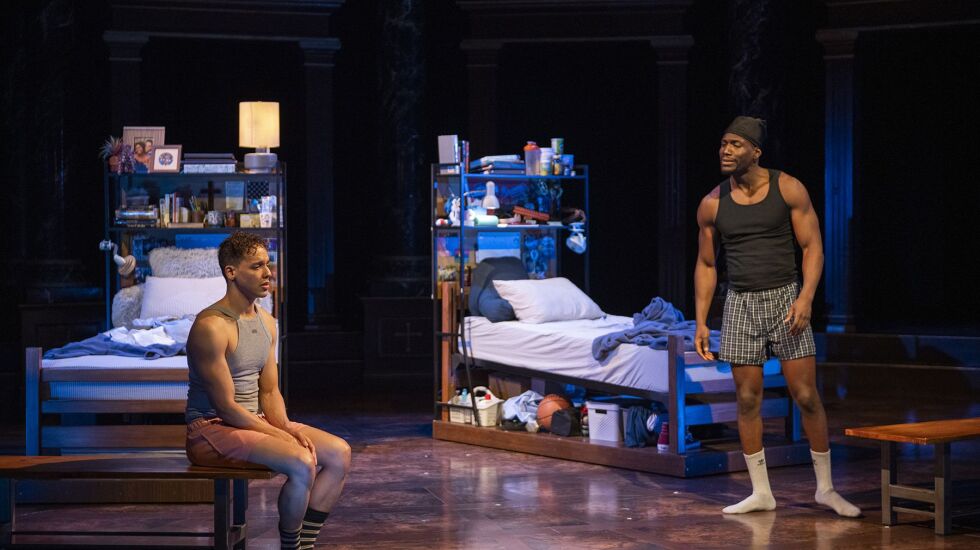
Coming-of-age stories have been around almost as long as humans have been coming of age. But with “Choir Boy,” playwright Tarell Alvin McCraney takes a familiar genre and turns it into a 100-minute emotional rollercoaster, every devastating dip and giddy rise delivered through a filter of a cappella music that takes the audience from glory to despair and back.
McCraney won an Oscar for penning the screenplay to “Moonlight,” which collected 2017’s best picture trophy. The depth and the empathy that defined the film is also the signature of the Tony Award-nominated “Choir Boy,” which runs through July 24 at the Steppenwolf Theatre. Directed by Kent Gash and set at an elite prep school for young Black men, the production is engrossing from lights up to curtain call.
McCraney bookends the narrative with graduations at the ultra-competitive (and fictional) Charles R. Drew Prep School for Boys. The first graduation begins as a triumph for Pharus (Tyler Hardwick), the junior selected to perform a solo on the school song that traditionally sends the seniors on their way. Better still, Pharus has been named choir leader for his senior year, a coveted position that he’s yearned for and worked toward for years.
But just as his magnificent voice is soaring to the rafters and turning the space into a celebration, Pharus’ moment is shattered by a racist, homophobic slur hissed from behind. His beaming triumph becomes something ugly and traumatic that will follow him through his senior year.
As “Choir Boy” continues, we watch as Pharus’ light — his confidence, pride, his sense of self and the joy he finds in music and his identity — is slowly diminished, right up until his own graduation arrives. This time though, the solar spot on the school song is overtaken by a startling moment of sheer, spirit-raising, defiant courage.
Hardwick’s luminous presence and powerhouse vocals give Pharus a star quality that can’t be mistaken, even when the verses are hushed to the most delicate pianissimo. But this is an ensemble piece first and foremost, and the supporting roles are as intricate as they are intriguing.

The initial slur — homophobic and racist — comes from two other Black choir members: Bobby (Gilbert Domally, serving a complicated bully with phenomenal step dance skills), the nephew of Headmaster Marrow (La Shawn Banks, mining more comic relief than seems possible from the role of a beleaguered educator) and Junior (Samuel B. Jackson), a scholarship student who can’t afford to get in trouble.
The choir also includes David (Richard David), an aspiring minister just beginning to explore his own sexuality. Finally, there’s Pharus’ roommate AJ (Sheldon D. Brown), the sort of intensely compassionate, loyal friend that can make the worst crisis bearable.
Music director Jermaine Hill ensures that the spirituals, hymns and occasional Boyz II Men/New Edition mashups woven into the story are as rich and essential as the spoken words. Listen for Brown’s verse on the folksong “Keep Your Eyes on the Prize (Hold On).” The lyrics are simple, about two men wrongfully imprisoned during Biblical times; Brown turns it into a clarion call to action and it will make the hair on the back of your neck stand up.
Another jaw-dropping vocal highlight is a dreamlike rendition of “Sometimes I Feel Like a Motherless Child,” sung as the five choir members strip down and shower. As Steppenwolf’s impressive waterworks soak the cast spread across Arnel Sancianco’s simple, effective set, they create a gentle, percussive pattering. Lighting designer Jason Lynch gives the scene the look of an impressionistic painting capturing the young men at their most vulnerable. When the scene segues into “What Wondrous Love is This,” the words are wrapped in steam, sexuality and, indeed, wonder.
The group’s haunting, invigorating take on “Ring Dem Bells” is extraordinary as well, the verses threaded around the students’ phone calls home, one-way conversations that illuminate the varied struggles and family demons each of them grapples with. Byron Easley’s choreography is all power and grace, including in an astounding, emphatic step-dancing that brings all the emotional subtext into glaring spotlight.
Pharus isn’t the first person to describe music as “honey in the rock.” But music director Jermaine Hill makes it flow with the power of the tides in “Choir Boy.”







